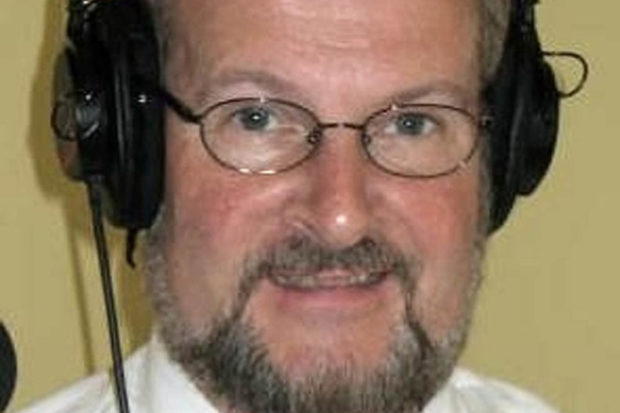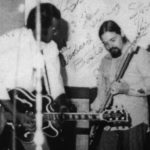

By Boston Woodard
A highly respected independent progressive recently returned to San Quentin. Peter B. Collins is an American radio host and media consultant from the San Francisco area. Collins spoke at San Quentin to about 30 prisoner writers.
Until 2009, Collins hosted The Peter B. Collins Show, which was “infused with dangerous San Francisco values like compassion, justice, and a living wage.” His show was based at KRXA in Monterey. Collins’ show continues on the Internet by means of listener-supported podcasts. He can also be heard on San Francisco’s KGO-AM intermittently.
Collins hails from Cincinnati, Ohio. When he was 19, Collins wrote about the Watergate scandal. He had a highly rated nightly talk show at an ABC affiliate owned by WLS-FM in Chicago. In the mid-1970s, Collins worked for KGO in San Francisco. He was hired away from KCBS-FM to host their morning show and remained after KCBS flipped to an album-orientated rock format as KRQR in 1982.
In the early 1980s, San Quentin prisoner Dennis Jones started the nonprofit Freedom Foundation and Collins served as board president. The foundation’s mission was to raise funds to defend prisoners who asserted their innocence. Collins was heavily involved with helping to exonerate these claims of innocence. During his work with the Freedom Foundation, Collins led a group of volunteers for five years to get 10 people out of prison.

Over the years, the Freedom Foundation’s efforts were taken up by the Innocence Project, which has helped to free 200 innocent men from wrongful convictions. Collins had high praise for the Innocence Project and the great work they do. “They are doing a fantastic job securing releases for those falsely accused of crimes they did not commit,” said Collins.
“During my involvement with the Freedom Foundation at San Quentin,” Collins says, “I met a lot of great people.” One of those people was John Dannenberg, a prisoner who wrote for the San Quentin News and was quite the “legal beagle” by all accounts.
When asked if the Freedom Foundation was still active, Collins told the group it was in a “dormant” state currently. Some of the funds that were raised to maintain the Freedom Foundation are now being donated to the Innocence Project.
About a year before Jerry Brown ran for governor, while he was California’s attorney general, Collins met Brown at a cocktail party. While Brown was “working the room,” Collins secured a seat across the table from Brown. Collins has known Brown for a long time, since Brown was chair of the California Democratic Party, so he decided to bring up the subject of lifers being held beyond their prescribed release date.
Brown agreed to talk about lifers and Collins’ assertion that California is wasting big bucks keeping many of these men and women behind prison walls who don’t belong there. Collins told Brown that all offender commitments are not the same and singled out Dannenberg. “Here is a guy who is an MIT-trained engineer, a legal expert and prisoners’ rights advocate, who poses no threat what-so-ever to society,” Collins explained to Brown.
Collins felt Brown was trying to intimidate him regarding his stance on why eligible lifers were being kept behind bars. “You just keep appealing reasonable court decisions that would allow this man to get out of prison,” Collins told Brown. “You’ve spent millions of dollars trying to fight his appeal to be released.” At the end of an approximate six-minute conversation, Brown told Collins “I’m going to look into that.”
At a memorial service in 2012, Collins ran into Brown again outside the service. Collins thanked Brown for his rate of parole approvals. Brown said it was “going OK so far.” Brown said his advisers told him to be careful about another Willie Horton. Horton was the Massachusetts prisoner who committed new crimes while on furlough from state prison.
The national attention Horton received cost then Gov. Michael Dukakis the 1988 presidential election. Collins said he gives Brown credit for the 82% approvals he has given thus far to parole recommendations in California. Lifers have the lowest recidivism rate of all offenders, a fact Brown probably takes into consideration when deciding a lifer’s fate.
Brown went public recently calling to give back the reins of the medical and mental health departments within the California Department of Corrections and Rehabilitation (CDCR) to prison officials. Collins said this would be premature. On realignment, Collins feels it “has been reasonable in reducing the overcrowding” but it doesn’t go far enough.
There is little evidence as to where the money for healthcare is being spent. Collins said he is concerned: “Because of the [still] high suicide rate among California prisoners, the health care system is not yet addressing many problems that still abound throughout the CDCR.”
Collins talked about administrative segregation security housing units (SHUs). He said that although SHUs may be warranted at times, that doesn’t “make it any less barbaric.” He said men spend 23 hours a day inside their cells and are allowed an hour in a small “dog run” like pen for exercise. He said there are California prisoners who have been locked in administrative segregation (Ad-Seg) for more than 30 years.
 Collins scoffs at CDCR’s contention that someone spending 10 years in an SHU is “acceptable, reasonable” treatment. If you are in the SHU, you are not eligible for parole; it can be completely arbitrary. He added, “SHU programs are a way that someone in power makes sure you never get out.” Collins said that this is an issue that needs a great deal of attention.
Collins scoffs at CDCR’s contention that someone spending 10 years in an SHU is “acceptable, reasonable” treatment. If you are in the SHU, you are not eligible for parole; it can be completely arbitrary. He added, “SHU programs are a way that someone in power makes sure you never get out.” Collins said that this is an issue that needs a great deal of attention.
Talking about Guantanamo Bay raised more questions. Collins talked about providing coverage on his radio show about “Gitmo” as it is referred to. He said it is an “outrage that the U.S. set up an offshore prison, creating this kind of limbo-zone.” In the past two years, only four people have been released from Guantanamo Bay.
Collins said this is barbaric and un-American, but “to be fair” he remembers, President Barack Obama tried to close down Gitmo but members of his own party said no. Collins said he believes that “on a level of morality and offensiveness, California (SHU) treatment of prisoners is only slightly better than how prisoners at Gitmo are being treated.”
Free world media access into the state prison system is another issue Collins has talked about on many of his radio broadcasts. In the 25 years preceding 1996 (when outside journalists were no longer allowed free access to prisons and prisoners), “there has never been an act of abuse of rules by a member of the press while covering a news story.”
Gov. Pete Wilson implemented the restrictions on media access into California’s prison system. This greatly impeded the ability to report the full story. Gov. Gray Davis refused to lift those restrictions before being recalled from office. Gov. Arnold Schwarzenegger continued the wave of secrecy.
The 1996 ruling that media will no longer have access to individual (specific) prisoners to prevent the “glamorization” of criminals serves the prison authorities well by preventing public knowledge of incidents. Collins said numerous legislative bills on media access have made their way through the State Senate and subcommittees, only to be rejected by Brown.
After lending his voice to hundreds of radio and TV commercials, and doing station promos for television and radio, non-broadcast sales and training programs, CD-ROMs and voice mail systems, Collins returned to talk radio in 2003. He became a host of Air America Talk Radio Network and SIRIUS Left, as well as via Webcast.
Collins is an officer of the San Francisco local of the American Federation of TV and Radio Artists (AFTRA) and serves on AFTRA’s national board. The Peter B. Collins Show—“News and Politics from an Independent Progressive”—is alive and well.
Before leaving, Collins told the group of prison writers, “It has been my pleasure to speak with you men today, I’m very impressed with the work you are doing and I look forward to hearing what you have to say through your journalism.”
Collins’ visit to San Quentin was an inspiring one. He is a true warhorse when it comes to news, politics and progressive issues. Many of the San Quentin prisoners who attended the event have followed Collins’ career over the decades and were excited to hear him speak.
“I pick 10 news stories every day that I care about to bring my listeners what is important,” said Collins.
To hear The Peter B. Collins Show, subscribe to the podcast at iTunes or www.peterbcollins.com.
*****
Boston Woodard is a prisoner/journalist. He has written for the San Quentin News and the Soledad Star and edited The Communicator. Boston is the author of Inside the Broken California Prison System, which is available at Amazon. Learn more at www.brokencaliforniaprison.com.
